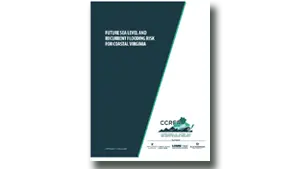 The report presents analysis of the best available existing data on coastal land elevation, sea level rise projections, vertical land motion (subsidence), and building and transportation assets.
The report presents analysis of the best available existing data on coastal land elevation, sea level rise projections, vertical land motion (subsidence), and building and transportation assets.
Sea level rise (SLR) projections are analyzed as Relative SLR (RSLR), combining the effects of vertical water rise (or “eustatic” change) with regional trends in vertical land motion, or subsidence. The study made use of available Commonwealth LiDAR elevation data, buildings, and roads as well as several sources of federal data, including sea level trends, tidal flooding and datums, and peer-reviewed and government reports. Maps of potential future inundation provided here represent a baseline assessment of impacts to land areas, including wetlands, parcels and development, roadways and buildings within the Commonwealth.
The total area at risk with RSLR in coastal Virginia is 424 square miles in 2040, 534 square miles in 2060, and 649 square miles in 2080. An additional 144 square miles will be vulnerable to minor tidal flooding by the year 2040, with similar areas of impact for 2060 and 2080. The total length of roadway potentially affected by RSLR and tidal flooding is 545 miles in 2040, 972 miles in 2060, and 1762 miles in 2080. The total number of buildings potentially affected by RSLR and tidal flooding is 30,795 in 2040, 57,740 in 2060, and 111,545 in 2080. Hampton Roads, the Eastern Shore, and the Middle Peninsula are the most severely and critically impacted. Additional metrics describing the potential risk from RSLR, minor (tidal) flooding, and moderate flood events can be found in the body of this report.
Impacted parcels, buildings, and roads are tabulated and presented in a series of charts, tables, and maps delimited by Planning District Commissions across coastal Virginia. The maps and related digital data promote sub-regional comparison and provide these organizations and municipalities a spatial product for first-order risk assessment and planning. Maps and tables are provided digitally in this report are also available as digital geospatial data for local spatial planning. The report further outlines inherent limitations and future improvements in the available data and emerging methods and scientific understanding to reduce uncertainty.
Click here to view the resource.




